The Politics of Hosting
Daniel V | November 6, 2016.
Climate summits let host governments publicise their environmental credentials, but we cannot be blind to their injustices.
This year the United Nations climate negotiations descends upon Marrakech. The stage is set for negotiators to continue their granular discussions, but also for the Moroccan government to showcase its own environmental ambition.
Praise has surrounded the Moroccan government’s audacious plans for renewable energy, which aim to generate over half of the country’s energy from wind, water and solar by 2030. In February, King Mohamed VI unveiled the first part of the world’s biggest solar energy complex in the city of Ouarzazate.
While the Moroccan government has welcomed the spotlight, the conference has also drawn attention to its more authoritarian and repressive elements.
Morocco has just experienced its most intense public protests since the Arab Spring. On 28 October, fisherman Mouhcine Fikri was crushed to death by a garbage truck compactor in the port town of Hoceima, as he tried to recover goods confiscated by the police. Activists accused police officers of ordering Fikri’s death, and civil rights associations denounced the illegality of the confiscation. Fikri’s individual case has been seen as emblematic of what is known as hogra: arbitrary abuses at the hands of the authorities.
These abuses occur in a wider context of human rights violations, corruption and impunity, in which the makhzen (the King and the royal establishment) exert decisive political control. Abuse of the rule of law by security forces is widespread.
Moroccan activists and journalists are routinely harassed or arrested. During the conference, negotiators and observers will likely be communicating through platforms such as Whatsapp, Skype and Viber. These VoIP (voice over international protocol) applications however were only recently unblocked in Morocco, and citizens fear they will be restricted once the summit concludes.
The marginal benefits of “environmental action” for local communities
Moroccan citizens also voice significant environmental and social grievances. Mining for example is one of the pillars of Morocco’s economy, and while it has lined the pockets of state coffers and private companies, many workers and communities feel that wealth has accumulated at their expense. In the village of Imider, local people have for five years been protesting the Imider Mine—Africa’s largest silver mine—for threatening their water access and agricultural livelihoods.
Morocco’s “green” energy system has also come under fire. As Hamza Hamouchene, founder of Environmental Justice North Africa, writes, “If the Moroccan state [is]…serious about its green credentials, why is it then building a coal-fired power plant at the same time, which represents an ecocide in-waiting for the already-polluted town of Safi?” Even the acclaimed Ouarzazate solar complex has been criticised for its ownership, its role in land appropriation, and its extensive use of water.
Climate refugees, environmentally-induced displacement and forced migration will be on the agenda at COP22, but the Moroccan government has received regular criticism for migrant rights violations. The country is also involved in the Saudi-led military intervention in Yemen, an intervention questioned over its legality and atrocities.
The oft talked about Western Sahara
Another crucial issue is the occupation of the territory of Western Sahara, which between 1884 and 1975 was a Spanish colony. When Spain withdrew in 1975 Morocco annexed the territory, flouting the judgment of the International Court of Justice, which recognised the right the Saharawi people to self-determination. This sparked a war of independence which ended in 1991 after an UN-brokered cease-fire.
The truce included the promise of a referendum on sovereignty, but 25 years this is not in sight. Freedom House ranks Western Sahara among the dozen least free nations in the world. Repression is pervasive. Amnesty International has reported widespread torture used by security forces to crush dissent in Morocco, particularly against supporters of Saharawi self-determination. In April, Saharawi trade unionist and political prisoner Saika Brahim died in custody, his body buried without an autopsy.
Laws incriminate those who “undermine” the country’s “territorial integrity”. Journalists have been charged or banned from writing for merely commenting on the conflict or describing Saharawis as “refugees”.
Morocco diplomatic ambitions are firmly tied to its territorial interests in Western Sahara. The country has spent millions of dollars lobbying international bodies and pressuring the United Nations into turning a blind eye. But the UN does not recognize Moroccan sovereignty over Western Sahara, defining it instead as a “non-self-governing territory”, entitled to a referendum.
Tensions have recently escalated. In March, during a visit to a Saharawi refugee camp in Algeria, Ban Ki-moon described the situation as an “occupation”. Late last year, the European Court of Justice annulled an EU-Morocco trade pact over the inclusion of Western Sahara. Morocco suspended relations, and €12m of EU funding for the COP22 was briefly withheld over the diplomatic incident.
The issue of Western Sahara is not an ancillary issue to the talks. It is directly linked to the Moroccan government’s climate ambitions. Several companies have already been issued with permits to explore for oil and gas reserves in the territory. A significant part of Morocco’s green development is slated to take place in Western Sahara itself, including two large solar plants and four wind farms. Various multilateral banks and institutions have already shied from funding these legally sensitive projects. Jalihenna Mohamed, from the Saharawi Campaign Against the Plunder, called on “all attendees of the COP22 climate talks to be careful when referring to the Moroccan projects – as many of them are not in fact located in Morocco, but rather contributing to the conflict in neighbouring Western Sahara, which is under annexation.”
Such controversy engulfing host nations and the venues of climate summits is nothing new. Domestic and international movements have frequently used climate summits as moments to raise consciousness around the troubled environmental and human rights records of host countries.
When Qatar was announced as the host of choice for the COP18, the general secretary of the ITUC Sharan Burrow said, “The international union movement will not accept climate change talks being held in a country which does not respect workers’ rights and is the highest emitter per capita in the world.” Trade unions and labour activists went on to use the summit to highlight the Qatari government’s poor labour standards, particularly for migrant workers.
At COP20 in 2014, the partners of assassinated Indigenous leaders took to Lima to reclaim justice and land rights from the Peruvian government. The conference also drew controversy over its venue: military base El Pentagonito. During Peru’s armed conflict, El Pentagonito was a “centre of extermination” where prisoners were tortured, murdered and incinerated.
This was not new. During the 2010 COP16 meeting in Cancun, social movements stressed the Mexican government’s duplicity, given its parallel development of environmentally damaging projects. Renowned writer Homero Aridjis called the summit a “moral and conceptual incongruence, an irresponsibility.”
Image is the obsession of government. In the same year, Mexico’s government used the COP as an opportunity to market itself as a tourist destination, and counter the country’s association with drug-fuelled violence. Morocco, like any authoritarian regime, has worked assiduously to present itself as a modern, democratic regime, and the COP hands it a precious opportunity to greenwash its reputation.
Is participation and scrutiny better than exclusion?
So what does it mean to host climate summits in countries or venues where gross human rights violations have or are taking place? Is participation and scrutiny better than exclusion? Would the COP lose legitimacy if only hosted by a coterie of wealthy, “innocent” states? Do you not deprive regional social movements of a chance to mobilise and voice concerns if certain areas are avoided?
There are no easy answers but what is clear is, climate change is a human rights issue, and no amount of rhetoric or sustainable initiatives can provide cover to injustice. Attendees of the summit, and those following from afar, should always look askance at the political theatre of summits, and ensure accountability takes precedence before acclaim.
Photo credits (in order of appearance): Hasna Lahmini, Magharebia, United Nations Photo






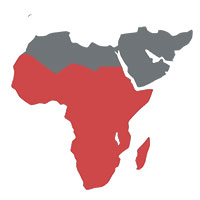
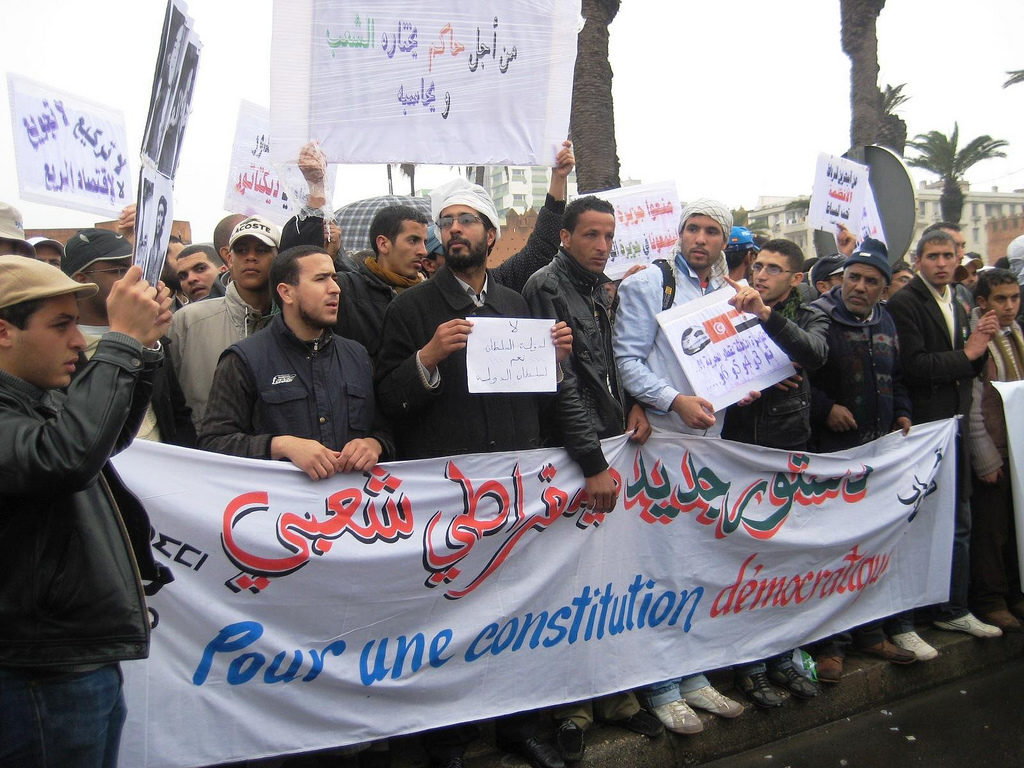
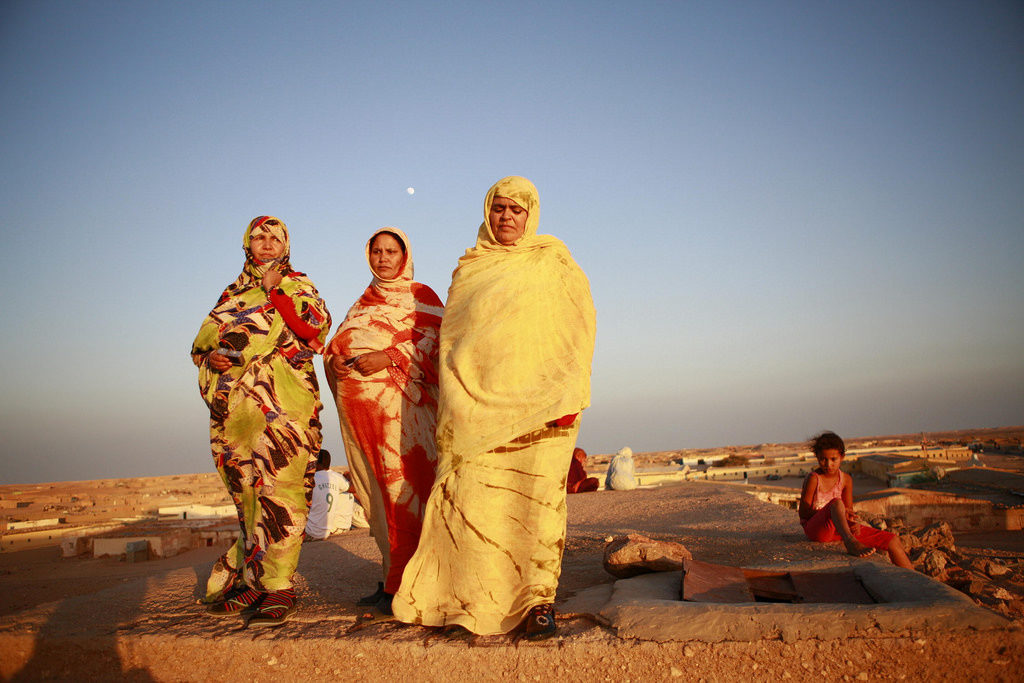

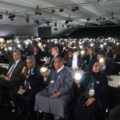
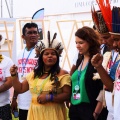



comment